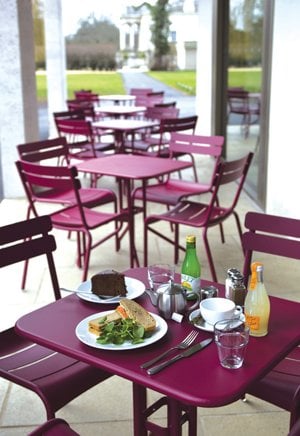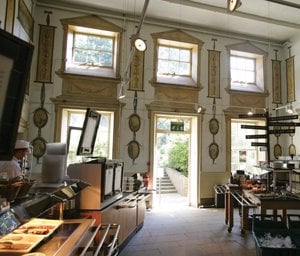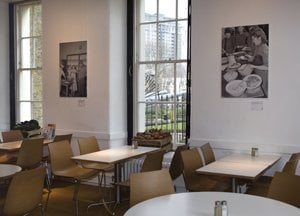Café culture
Struggling to make the most of your catering arm? Chris Brown has some suggestions



Size matters. Visitor attractions know their footfall, and this is key in assessing a café’s business case since most cafes do little more than serve their existing visitors. Operators who believe they can generate a whole new business without existing footfall are entering the world of destination restaurants and may be kidding themselves. It is always worth asking if there is a business case; too few sales to cover the labour costs and you will incur losses. Contracting out offers no panacea as the possibly over-optimistic caterer will not last long. A catering consultant can advise.
Assuming we have a healthy flow of visitors, the often-asked question is whether to run the catering in-house or outsource. There are examples of successful in-house operations – Tate Catering and the RSC, Stratford – and our response is to ask do you have the interest and time to champion the catering cause. Don’t expect the (generally lowly paid) catering manager to know how to meet and exceed your customers’ (and the venue’s) expectations. Whilst there is no right or wrong answer, catering is rarely a pot of gold. We find that visitor attractions are hugely proud of their brand and want this reflected in their catering. The best arts experience can be ruined by a stale scone and a powdered cappuccino. A high quality café can bring in additional visitors, generate extra column inches of publicity and add lustre to your main core activity. Quality is important to reputations and can help justify premium pricing – visitors will only have one coffee and cake so make it good and charge a full and fair price for it. Quality in catering can be defined in terms of food standards, but service and innovation require management that is passionate. An informed catering consultant running a professional tender process should ensure you get a caterer that does more than tick boxes. This is why the idea of e-procurement in terms of appointing a caterer is unwise – it’s passion, not price, that you are trying to evaluate.
There is one small but telling sign of a café that will never maximise its sales – selling low price and low margin confectionary. It is clearly better to sell a £1.50 brownie with its 80% gross profit margin. Maximising sales involves looking at the service style, busting queues, promoting product (be it crisps with the sandwiches and cakes on open display) and remembering that customers buy with their eyes. We shouldn’t eat cake, but we will if the caterer has made it irresistible. Achieving margins should be simple given we are selling flavoured water (soup, coffee and tea) and flour (scones and cake) most of the time. But boy can this go wrong. Wastage, incorrect portion sizes, poor purchasing – the list is long, includes theft and can result in a margin far from the 70% gross profit that should be regarded as a benchmark. Monthly, if not weekly, calculation of the food cost is vital.
Labour cost is the other area where all those hard won catering sales can be easily lost. The managers who go to the trouble of adjusting staff numbers to varying customer numbers are gems. Part-timers, accurate forecasting and diligent rostering are key to achieving a 35% or better labour cost.
Concession rates (income from the catering supplier) will depend on the footfall and are generally based on a percentage of sales rather than any attempt to calculate profit. A really busy station or airport location may demand 25%; a major visitor attraction up to 20% and venues with catering sales under £1 million the concession rate will be between 8% and 15% of sales. Caterers make poor bankers and if you want capital investment from a caterer it will be reflected in lower offers and longer contract terms. Beware, it may mean that your choice of caterer is restricted to the big operators.
It has to be said that most large venues do out-source their catering leaving them to concentrate on their core activity. Those with the most successful catering use a professional independent catering consultant during the tender process and appoint a caterer who gives the most confidence that what they have put down in writing will actually be delivered. Time and again the passion and innovation of owner operators pays dividends in terms of achieving the virtuous circle of happy customers, increased sales and increased concession to the venue. The most common mistake in maximising catering income is not placing sufficient outlets where they are visible to take advantage of impulse sales of everything from coffee to ice cream and not having a leading edge caterer that is driving forward standards and sales. Catering can be a wonderful income and positive experience generator. Seek out and treasure a professional and passionate café specialist.
Join the Discussion
You must be logged in to post a comment.